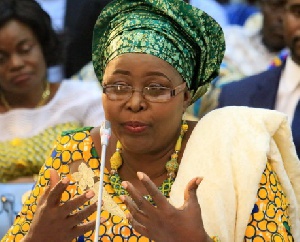Hajia Alima Mahama, the Minister of Local Government and Rural Development, has called on stakeholders to join forces with government to improve on efforts to connect secondary cities to propel national growth.
Secondary cities include municipalities and are often seen in urban hierarchy. They are largely determined by size, population, function and economic status.
She said connecting secondary cities and equally distributing resources to them would enhance national development and reduce the challenges associated with urbanization.
She made the call at the “2020 Ghana Urban Forum” held in Accra by the Ministry and its stakeholders on the theme: “Unlocking the Systems of Planning, Connecting and Financing for Secondary and Intermediate Cities to Propel Growth Towards the ‘Ghana beyond Aid’ agenda.”
The stakeholders included representatives from the Metropolitan, Municipal and District Assemblies, the National Development Planning Commission, UNICEF, Coalition for Urban Transition, Research Institutions, Think Tanks, Civil Society Organisations and other Ministries and their Departments and Agencies.
The forum was also to prepare stakeholders to represent Ghana in the “World Urban Forum” slated for February 7 to 13, 2020 at Abu Dhabi under the global theme: “Cities of Opportunities: Connecting Culture and Innovation”.
The World Forum will provide an opportunity for stakeholders to highlight the major challenges being encountered globally in the fight against climate change, through the lens of local implementing partners.
Hajia Mahama said as Ghana continues to urbanize with a growing population, there would be challenges with housing, transportation, energy, employment and provision of essential services to support education and healthcare system.
“We, therefore, need to position ourselves against adverse effects of climate change such as droughts, floods, earthquakes. We also need to evolve cities in a way that creates shared developed prosperity, tangible benefits for citizens in the creation of jobs, and ensure that we promote cleaner air practices like usage of clean cooking methods,” she said.
She urged stakeholders to consider the promotion of digitization to address issues that were becoming complex in the management of cities and towns.
Emeritus Professor Brian H. Roberts, the Director of Urban Frontiers, Australia, reiterated the importance of secondary cities in national development, saying they were crucial conduits and hubs in global and national supply chains.
Secondary Cities, he said, also supported the flow of resources and goods for operation and development of the world’s largest 600 cities which produced 60 per cent of World’s Gross Domestic Product.
“Improving connectivity and networking with systems of secondary cities would significantly lower disparities in levels of regional development, increase national productivity and prosperity, and reduce the pressure of rural-urban migration on the development of large metropolitan regions,” he added.
Ms Sylvia Lopez-Ekra, the UN Resident Coordinator, said over half of the world’s population now live in cities and with this number expected to double by 2050; urbanization had become one of the world’s most transformative trends, posing several sustainability challenges.
On the other hand, she said, it also presented great opportunities; hence the need for Ghana to position it at the heart of her development agenda.
She said it was unfortunate that secondary cities, most of which are located in Asia and Africa, were not given enough attention and often ignored when it comes to the productive role they played in a balanced national system of cities.
Ms Lopez-Ekra urged Ghana to adopt innovative approaches to strengthen the capacity of local government authorities to enable them to finance their development agenda to meet the demands for adequate infrastructure and social services for their growing population.
General News of Wednesday, 15 January 2020
Source: ghananewsagency.org

















